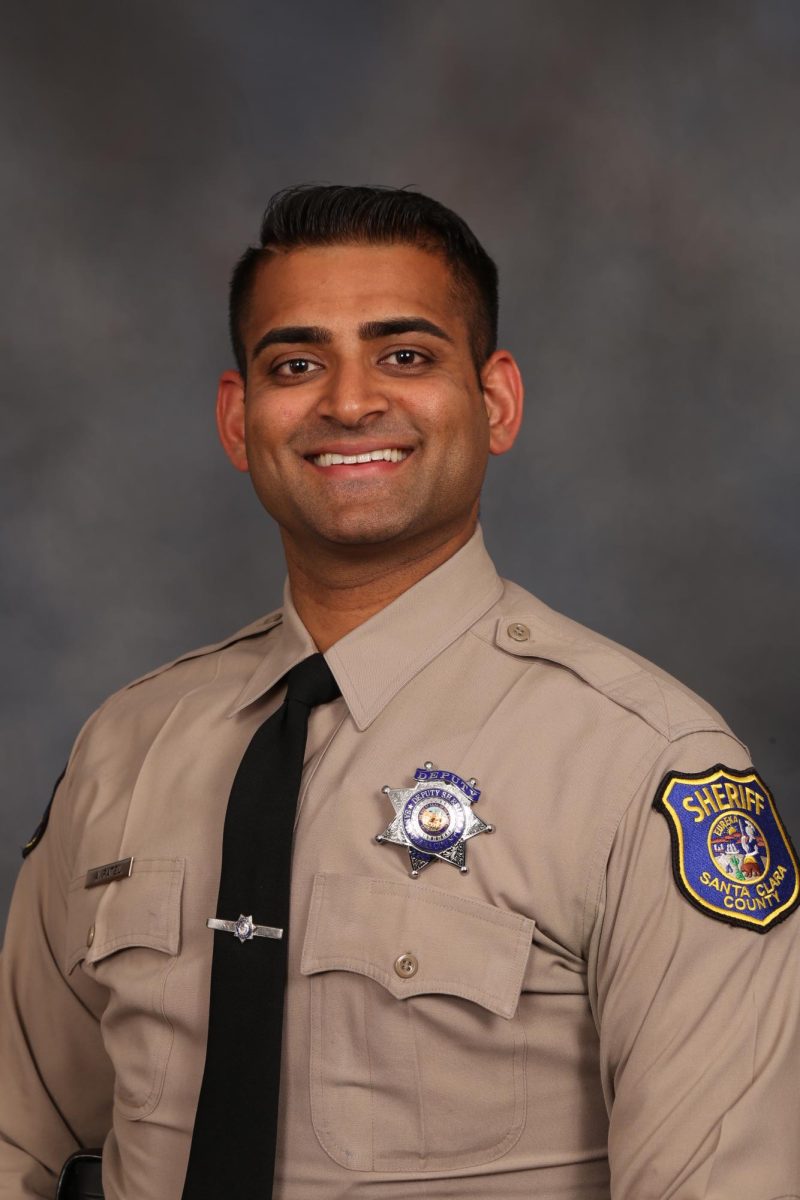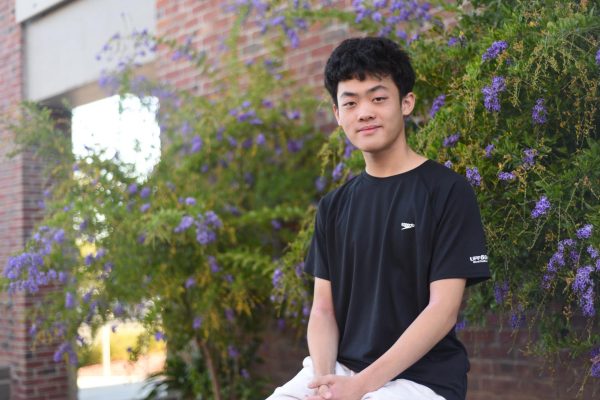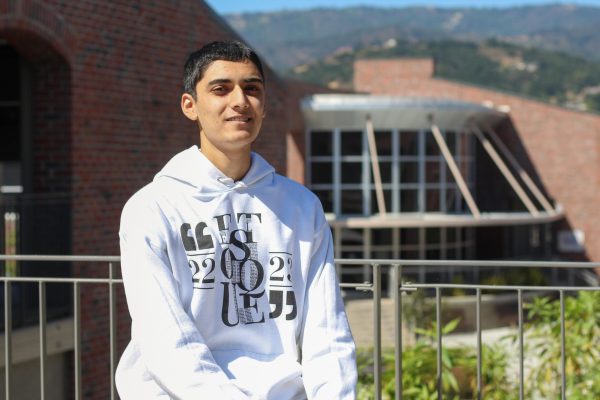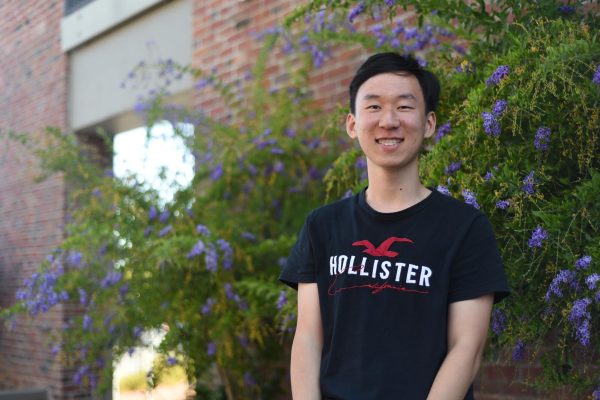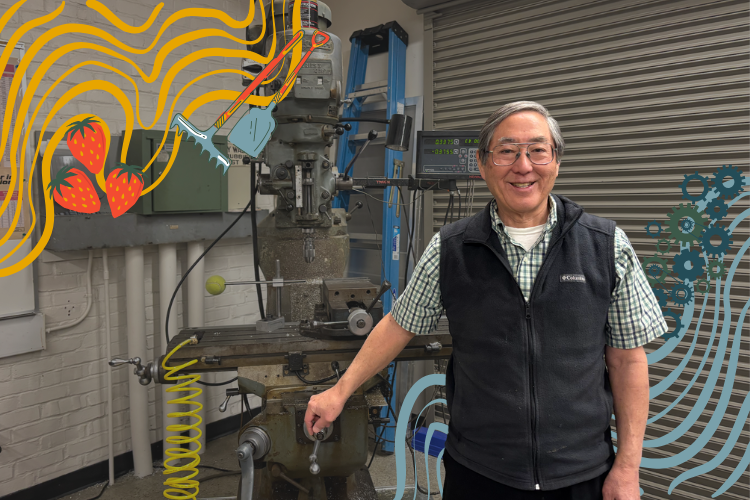EE: From assisting school administration to ensuring the safety of campuses, SROs such as Officer Aalok Patel, work to ensure that schools stay as a safe and proactive community in the area we live in.
EE: Where did you grow up?
AP: I grew up in San Jose, California. My childhood was good — I had two loving parents. They were very strict. It was very different from what most of you guys would have to deal with. If I got in trouble, my mom would handle things differently than we’re used to, but they still very much loved and cared for me, which is, which is a lot.
I absolutely did not like school. I had a hard time with school. I didn’t like middle school. I didn’t like high school. It’s not that I didn’t like to go to school, I just had a hard time with classes. I finished high school with a 2.3 GPA, which is a pretty poor GPA, but I still went to college after high school, I still got accepted after high school, and I still got a full ride actually. So, I got a lot of scholarships and I got a lot of financial aid which helped a lot.
So, I went to college at Humboldt State for four years and that’s kind of where I feel like I grew up. So, I went to college and I majored in Recreation Administration. After that, I wanted to be a firefighter while I was going to college, and I did firefighting as a volunteer for about four years to five years. I volunteered with the Arcata Fire Department and that’s kind of where I learned a lot about firefighting. But when I finished college, no fire department in California was hiring, and it was extremely difficult to get hired on the fire department at the time.
And so, I was 21 or 22 years old, with a college degree, fresh out of college, and I needed a job. While I was going to college, I was working with the campus police department, and I got super familiar with the cops on campus. I’m like, man, this is pretty interesting, I kind of like this. So, they got me a job working in juvenile hall. I worked in a juvenile hall in Humboldt County for six months. After that, I got a job working in the jails here in Santa Clara County with the adults.
I did that for about a year and a half, and now, after that, I left in 2017 and joined the law enforcement division within the sheriff’s office within Santa Clara, and I’ve been doing that for the last five years.
EE: What was your parents’ reaction to you getting your job?
AP: My parents’ reactions — so obviously, there’s cultural expectations. Being a person who’s Indian, we have to become a doctor, a lawyer, an engineer, right? And this is talked about pretty often. First and foremost, my parents were just happy I went to college and actually graduated, right?
I wanted to do firefighting, but as soon as I said I wanted to be in law enforcement, they were scared — as any parent would be. They see stuff in movies and think, “Oh, this is what happens, and this is kind of what life is.”
So, they were definitely worried and not supportive of my choice, but they were also like, “Man, at least you’re going to get a job and you’re going to do something with your life.” And so, they kind of realized that as I grew up, I just made my own decisions.
I would take in their advice, but I would still do what I wanted to do. So, they kind of realized, “You know what? He’s got a job, he’s got insurance, he’s on his own, and he’s making money. So, not much more we can do.”
I’m sure there’s like an everyday worry. You know, “Am I going to come home today? Am I going to come home tomorrow?” So, there’s a constant worry. But I feel like I do a pretty good job of keeping myself safe.
EE: Could you tell me a little bit about your work as an SRO? What’s like the day-to-day tasks you do?
I have 18 schools by myself, all in Cupertino. So that’s all the way from elementary to high school. I’m still a police officer, but my goal as being SRO within the City of Cupertino is to bridge the gap with the community and to let kids interact and have these conversations. People have this misconception that police officers are very scary, they’re very intimidating, or they’re not human.
And as I came in, I came in cracking jokes, right? And you guys were like, “Oh, this guy seems pretty easy-going.” I put you guys at ease, probably.
A couple of things as an SRO are presentations. So from kindergarten to second grade, I’ll teach stranger-danger. Then from third to fifth grade, I do internet safety. I talk about how to be safe online, about internet safety, bicycle safety. Sometimes, I have presentations or interactions with just teachers.
I try to be there more like a support person or as another parent. Sometimes, I get told information about students who don’t have much money, and their parents are very, very poor, and that they don’t have access to a bicycle. It’s not my job to get them a bicycle. But I make that my mission, and today, a kid should not have to go without a bicycle. So, I’m going to start reaching out to various organizations to try to get a kid a bicycle, or a helmet. We try to get their bicycles fixed, sometimes we find out that they don’t get Christmas presents, right? So, then we try to get them Christmas presents. My teammates and I, our team, get together, and we use our own money to get money together, and we give presents to them.
As a School Resource Officer you have to have a certain personality and you have to get out of your comfort zone and be able to talk to people. Because as you guys have probably seen, police officers can be kind of intimidating, not super friendly. And so, my goal is to kind of change that, even within our own agency.
EE: What areas or schools do you typically work at? Are there some that you work at more than others?
There are some schools that don’t want their SRO officer walking around because it not only makes the students feel uncomfortable, some staff members feel uncomfortable. The majority of my schools love having us on campus.
EE: Can you tell me what the training process was like being an SRO?
AP: To become a police officer, it’s pretty competitive, or it used to be very competitive. When I applied to become a police officer, I competed for 30 spots against 3,000 applicants.
There’s a written test that you must first pass. After the written test, there’s a physical agility test. And once that’s complete, you do a background questionnaire, where they ask you a bunch of questions.
Once that’s complete, you have a polygraph which is like little wires — I guess on TV [it’s like] where they call it a lie detector test. Then you’ll have a psychological questionnaire.
Once all those are done, then you get your medical. So you get fully examined to make sure that you don’t have any pre-existing injuries that will disqualify you from being a police officer, like hearing, vision or physical limitations. And after that, you have your final interview. Once you have your final interview and you get the job, then you go into the police academy. And a police academy can range anywhere from six to eight months. If you fail more than two tests, you’re out of the academy.
So the academy can be really stressful, and there’s physical stuff to it, and then there’s an educational portion to it to learn. So it can be very demanding, but things have changed to make it less physically demanding and more academically demanding.
Once you’ve finished the academy, then you go on to what we call a “field training program,” in which you are paired up with a senior officer for three to six months and you’re constantly paired up with them. Their job is to teach you how to become a police officer by yourself. I had a senior beat partner always next to me helping me, and in those three to six months, every single day [we] got an evaluation. Every single day.
They say “hey, you did good at this, you did awful at this, awful at this and awful at this.” Everyday. So you’re getting critiqued for your work performance: Hey, “your shoes aren’t shined,” or “your uniform doesn’t look great.” “You forgot to shave today and your hair looks like crap.” All those stuff you get graded on. So people don’t know any of that stuff.
EE: What are some challenges you face on the job?
AP: Right now, we have a massive shortage of police officers — and it’s not just a California or Santa Clara County thing — it’s a nationwide shortage. People are just not applying to become police officers. So, we’re being forced to work longer hours.
Sometimes we had dealt with pretty dramatic calls, where it’s kind of hard to deal with. And so, it’s very important that police officers talk about those calls, talk with their beat partners or go get professional help. If a call is a little challenging to deal with right, like a baby that died. Stuff like that kind of bothers people, or even suicides especially with teenagers. That can be very traumatic because you never know what that officer is dealing with at home.
When we come to work, we are constantly on a heightened alert or just constantly awake and we’re looking around. We’re making decisions constantly non-stop because we’re always looking for the worst case scenario happening to us. We’re like, hey, “if something happened to me at this [traffic] light, what would I do?” “If somebody attacked me while I was stopping at this [traffic] light, where am I going to escape?” “If this call came out, how am I going to prepare and respond to that call?”
So there are those challenges, but to kind of defeat those challenges, it’s very important to work out and stay fit, whether it’s a brisk walk for 30 minutes a day or it’s a run, work out or lift weights. It’s just very important to be physical within this job.
EE: Are there any aspects that were rewarding or memorable, maybe significant moments?
AP: When kids come up to me after you guys graduate or you guys come up to me, even a year later, being like, “hey you were in my class, and everything you said was very true about life.” It’s something that makes me very happy.
So it is very time consuming but it’s very rewarding and I feel like I’m making a difference. We’ve interacted with your parents and you guys don’t even know that, and no one’s able to make that connection until you guys interact with them. [They’re like], “hey have you guys seen that
I’m the only Indian officer in Cupertino. I love it when people mention my name or my partners. I love it when you don’t see my other partners, but do know officer Patel. Like, “dude, the kids are raving about you,” and I’m like, that’s great. That makes me feel like I’m doing my job, because I have to go out and make myself available and interact with you guys. And to do that, it’s very time consuming because I have 18 schools to do it, all the way from elementary to all the way to high school.
EE: Some members of the school community are concerned about SROs. They believe that it leads to over policing, marginalized groups being overpoliced specifically. Directly responding to these concerns, what would you like people to know about this?
AP: Follow this website, it’s called “Breaking Barriers United.” He’s a police officer, actually a School Resource Officer. I don’t know if he’s still a police officer or not, but I think he is. He addresses it really, really, really well. He talks about this exact question, and a lot of people will say, we don’t want police officers in our schools. And there’s a phrase, what we call the “silent majority.”
The silent majority, which would say the majority of the population, wants police officers on campus versus the smaller group that makes a lot of noise and speaks on behalf of the majority population, which is not true, will say, hey, “we don’t want police officers on campus.”
All it takes is just one person complaining to make a huge change, right? For example, with George Floyd. One incident happened, and nationwide change. Actually worldwide. There’s protests in France and other countries. So there was a massive, massive change. And so to those individuals that don’t want police officers on campus, yeah I agree, there are sometimes when there are bad officers, right? But there’s also bad teachers. There’s bad doctors, there’s bad managers, there’s bad tech people. Every assignment has a horrible person in it. And you will have to find a police officer that wants to be an SRO, and that wants to go out there and interact with people. Because sometimes people will become SROs who just want a different environment and a different assignment, and it’s not really the best fit for them.
And one bad incident happens, and they forget about all the good work I did. So I do one bad thing, and then everyone can forget about all the good that I’ve done. So that’s another thing that’s very stressful about my job. People don’t know much about what I do. And so the people will say, “Hey, we don’t want SROs on campus.” You have no idea what difference I make, you have no idea what I do or how I do my job, because it took me more than five years to get to know how to do my job.
All it takes is one interaction. And I have had many students and adults being like, “I don’t like law enforcement, but I do like you.” And I’m like, “how can you say that?” That statement for me doesn’t make sense. You don’t like cops but you like me? [But they might say], “yeah, but you’re cool.”
[So] we all have a story to tell, you just gotta be willing to listen.
EE: Do you have a favorite school?
AP: Do I have a favorite school? Oh my goodness. Well, you know I feel welcomed at pretty much all my schools. And each school is very warm and forthcoming to me. There’s a specific school where I went to and I became really, really good friends with one of their assistant principals and we ended up going and traveling to different countries together.





